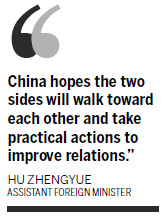China
Officials: Goodwill needed from Tokyo for Sino-Japanese talks
By Qin Jize (China Daily)
Updated: 2010-10-22 07:53
 |
Large Medium Small |

Beijing's hopes are high in spite of poor relations with neighbor
BEIJING - Chinese officials said on Thursday that a summit meeting between Beijing and Tokyo will require suitable conditions and goodwill, and urged Japan to demonstrate sincerity for the sake of improving bilateral ties.
Assistant Foreign Minister Hu Zhengyue made clear that Tokyo is responsible for improving the atmosphere for talks, citing recent remarks by Japanese senior officials.
"China hopes the two sides will walk toward each other and take practical actions to improve relations", as opposed to doing otherwise, Hu told a news conference.
Premier Wen Jiabao is scheduled to leave Beijing for Hanoi next Thursday for a series of Asian summit meetings. Japan, meanwhile, has been pushing for talks between prime ministers on the sidelines of the gathering in Vietnam.
However, Japanese Foreign Minister Seiji Maehara's recent remarks have undermined such efforts. Hu, for example, cited Maehara's remarks on Oct 15 saying that there was no rush to hold the leaders' meeting.
"To every day make speeches attacking China (in) words that should never come from a diplomat, I don't wish to add comment," said Hu.
"When I say we need an atmosphere, a need to create conditions for the meeting, I have a basis for it," he said.
Hu said Sino-Japanese relations are very important for both countries and China has insisted on enhancing communication and solving the disputes through dialogues.
He said Beijing strongly values such ties, adding that an informal meeting between Wen and his Japanese counterpart Naoto Kan has been ruined.
"We had very good contacts in Brussels. Why keep on hurting such good prospects?" he asked.
Sino-Japanese relations have been strained since a collision between two Japan Coast Guard patrol ships and a Chinese trawler on Sept 7 in waters off the Diaoyu Islands in the East China Sea.
Beijing then broke off all high-level contacts with Tokyo after Japan illegally detained the captain.
Sino-Japanese relations have since entered into a critical phase when either progress or setbacks are possible, according to Liu Jiangyong, a senior scholar of Japanese studies at Tsinghua University.
"The informal meeting between the countries' prime ministers in early October has shed light on the upswing of the relations. The resumption of the people-to-people exchange is one such example," said Liu. "However fundamental differences still lie in the issue of the Diaoyu Islands."
It is worth noting, Liu added, that some right-wing Japanese politicians are taking every opportunity to seek to contain China in the interest of expanding Japanese military expenditures.
"Some Japanese politicians are trying to manipulate public opinion by arousing nationalism at home - but their real intention is to renew a national defense agenda for the purpose of strengthening Japan's military deployments," Liu said.
The key to restoring this soured relationship, Liu added, is to show genuine willingness to resolve the problems on common grounds and stop making irresponsible remarks.
But "Japan's hostile attitude not only worsens the bilateral relations, it sullies Japan's own international image," Liu added.
He Wei contributed to this story.
China Daily